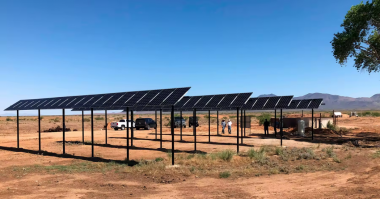Perspectives from the Industry
July 1, 2015, By Michelle Segrest
Reporting for Empowering Pumps
In May, I was proud to be a participant and speaker at the historic Water Technology & Funding Summit in Pasadena, California. This was an amazing gathering of thought leaders, politicians, decision makers, technology experts, universities and legislators spearheaded by the Water Technology Hub.
The “disruptive collaboration” that ensued has sparked many innovative partnerships and solutions toward the growing threat caused by the severe drought in California and other arid regions of the world.
“We live in a time where there are growing concerns regarding the scarcity of water,” said Andrew Yegnazar, Water Technology Hub’s Founding Chairman. “No matter where you are, no matter what your background is or your occupation, water remains a basic necessity of life. The great news is it seems new groups with the same passion are popping up all over the place. This is clearly an area where if we work together the sum of all our efforts will truly be greater than if we attempt to develop a solution on our own.”
The Water Technology Hub’s mission is to engage innovative thinking, target effective investments, launch collaborative initiatives and commercialize new water technologies.
Here are some recent headlines with regard to the California drought. Let us know about your company’s technological efforts toward solving the issue of water scarcity.
California’s Severe Drought Takes Toll on San Francisco’s Aging Sewer System
You might think that the drought would give the 150-year old sewer system a break, with not as much water going through it. But, while San Franciscans are sending less water down the drain because of conservation, the same, or more sewage is being sent through the system that isn’t being drained as well as before.
Source: CBS
Funding for Drought-hit California
In order to protect funding for water projects in California, the US Department of Agriculture (USDA) has formed a new partnership with the US Department of the Interior (DOI) and Natural Resources Conservation Service (NRCS), along with other private and state investors, to support water conservation and restoration programs.
The goal is to invest a minimum of around $210 million in projects that align with the US Presidents resiliency initiative. “It is great to see water partnerships spanning U.S. federal and state government agencies and also extending to the private sector,” said Jon Freedman, Vice President of Government Affairs at GE Water & Process Technologies. “This is exactly the type of coordinated and boundary-less leadership we’ll need to address the scarcity challenge in California.”
Source: UsedtoUseful.com
Read more: http://usedtouseful.com/post/122442597725/funding-for-drought-hit-california
Troubled Delta System is California’s Water Battleground
Fighting over water is a tradition in California, but nowhere are the lines of dispute more sharply drawn than in the Sacramento-San Joaquin Delta, a 720,000-acre network of islands and canals that is the hub of the state’s water system.
Giant pumps pull in water flowing to the delta from the mountainous north of the state, where the majority of precipitation falls, and send it to farms, towns and cities in the Central Valley and Southern California, where the demand for water is greatest. For decades, the shortcomings of this water transportation system, among the most ambitious and complex ever constructed, have been a source of conflict and complaint.
Source: The New York Times
Parched California Farmers Hope to Tap Wastewater from Cities
Facing record-low water supplies and a dry summer ahead, some California farmers are getting creative in looking for new sources of water. In one community, they’re planning to buy water from cities — after it’s already been used.
Through flushing toilets and running faucets, the city of Modesto produces millions of gallons of wastewater a day, just a stone’s throw from some of the driest agricultural areas in the state.
In a few years, that wastewater — treated and disinfected — could flow to farms in the Del Puerto Water District, in what would be the largest urban-to-agriculture water recycling project in the state.
The city’s wastewater treatment plant is undergoing a $150 million upgrade to meet new water quality requirements. Currently, most of its wastewater is discharged into the San Joaquin River, and to protect the river, the city is being required to meet higher, “tertiary,” standards.
Source: KQED Science
Finding a Solution to the Drought Matters
Finding the world’s most innovative water technology just became easier with watercluster.com, the first online platform to connect technology, corporates, investors, key industry stakeholders to solve urgent water problems compounded by record drought on the West Coast.
German-born waterpreneur Thomas Schumann was inspired to launch the online venture by the U.S. Environmental Protection Agency Water Technology Innovation Cluster Program after realizing Southern California was missing a water cluster initiative to help with its immediate needs.
“This industry needs a dynamic marketplace where resources can quickly be matched and deployed to address the growing need for new water solutions,” says Erik Hromadka, CEO of Global Water Technologies (GWTR), which was the first company to join. “We look forward to being part of this exciting new venture.”
Schumann seeks “Disruptive Collaboration” through the online platform, which has members working together and matching needs with water conservation, recycling and treatment solutions in a real-time environment.
“Southern California is a key market for innovation and the perfect place to introduce a new paradigm putting the crisis to work, matching new water technology with corporations, investors and industry leaders from around the world and focusing on action and work instead of mere talk,” says Thomas Schumann.
Source: Watercluster.com





Comments